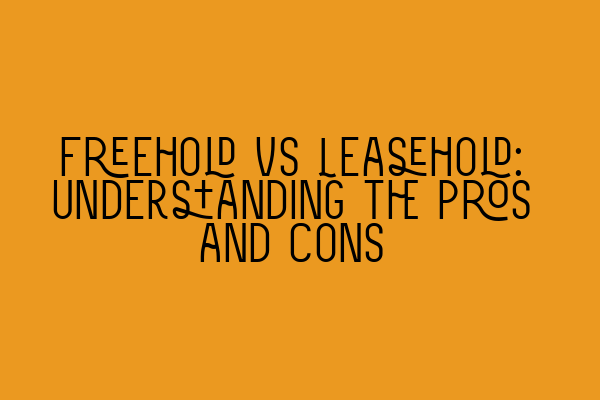Freehold vs Leasehold: Understanding the Pros and Cons
Welcome to SQE Property Law & Land Law blog! In this article, we will explore the key differences between freehold and leasehold property ownership. If you are planning to buy a property or are involved in property law, understanding these concepts is crucial. So, let’s dive in!
Freehold Property Ownership
When you own a freehold property, you have complete ownership and control over both the property and the land it sits on. This means you are the outright owner, with no time restrictions or obligations to anyone else. It offers the highest form of property ownership and provides you with the freedom to make decisions about the property without seeking permission.
With freehold ownership, you have the right to make alterations, renovations, and modifications to the property without any restrictions. You also have greater flexibility in selling or transferring ownership.
Legal challenges in property transactions: A comprehensive guide
Pros of Freehold Ownership
- Complete ownership and control of the property
- Freedom to make changes without seeking permission
- No ground rent or service charges to pay
- Potential for increased property value over time
Leasehold Property Ownership
Leasehold ownership, on the other hand, means that you own the property for a fixed period of time, specified in the lease agreement. While you have the right to occupy the property, the land itself is owned by someone else, known as the freeholder or landlord.
Leasehold properties are typically flats or apartments, but they can also include houses. Under a leasehold arrangement, you will have certain obligations towards the freeholder, such as paying ground rent and service charges. Additionally, you may require permission from the freeholder for certain alterations or changes to the property.
Navigating Lease Laws in the UK: Essential Guidelines for Tenants and Landlords
Pros of Leasehold Ownership
- Lower upfront costs compared to freehold
- Shared responsibility for common areas and maintenance
- Leaseholders may have the right to extend their lease term
- Access to communal facilities or amenities
Freehold vs Leasehold: Which is Right for You?
Determining whether freehold or leasehold ownership is right for you depends on several factors. If you prioritize complete ownership and control over your property, freehold is likely the better option. However, if you are looking for a more affordable option with shared responsibilities, leasehold can be a suitable choice.
It’s important to carefully review the terms of a leasehold agreement before committing to it. Consider the length of the lease, ground rent and service charges, any restrictions on modifications, and the financial implications of extending the lease in the future.
Dominate Property Law Questions: Avoiding Common Pitfalls
In Summary
Freehold and leasehold are two different forms of property ownership, each with its own pros and cons. Freehold provides complete ownership and control, while leasehold offers a more affordable option with shared responsibilities. Understanding these concepts will help you make informed decisions as a property owner or in the field of property law.
SQE Preparation for Property Practice: Mapping Out Your Strategy
We hope this article has provided you with valuable insights into freehold and leasehold property ownership. If you have any further questions or need legal assistance with property matters, please feel free to reach out to our team at SQE Property Law & Land Law.
